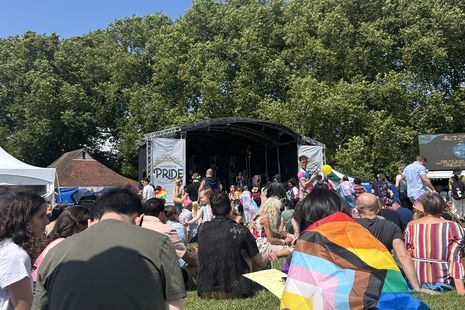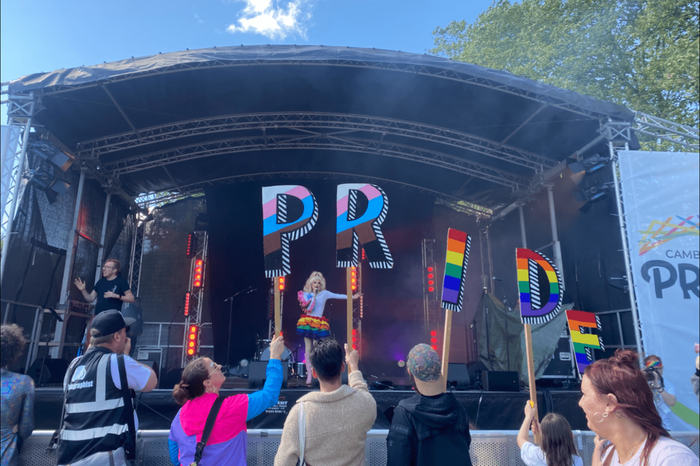Reinvestigating Pride in Cambridge
A year after her first visit, Georgie Middlemiss revisits Cambridge Pride and explores the divergence between town and University in its celebration

A small trolley laden with rainbow-plastered items sat outside Jesus Green on June the 14th. My friends and I left bearing a small flag, a couple of pound coins lighter. Walking through Jesus Lane gate, a trail of stalls lay splayed out across the right-side path. Saxophones echoed from a large stage. The dwindling state of many UK Pride events this year – with many postponed or cancelled – makes the continuation of Cambridge Pride an impressive feat. The joyful and genuinely community-centered space of Pride contrasted a University community in which Pride events were largely neglected. Last year, I visited and commented on Cambridge Pride. This year, I spoke with the working group behind it and with various visiting students to answer the question: what’s left for Pride month in Cambridge?
“The one thing we want to reassure everyone of is that we are queer community of volunteers organising something for our own community,” the organising team behind Cambridge Pride told me. Behind the event is a team of a mere ten people, all Cambridgeshire locals, either part of the Pink Festival Project or simply interested individuals: “The core group is very small.” From their beginning in 2019, they are now proud to be, as they describe it, “an annual fixture in the city’s summer calendar.” Its continuation is especially notable in light of the cancellation of other local Cambridge events, such as the Strawberry Fair and the Cambridge Folk Festival.
“A questionnaire from the UK Pride Organisers Network found that over 85 Pride Organisations saw funding decreases”
The group´s openness to improvement and new ideas is reassuring, and indeed refreshing. This year, an open letter was sent to the Cambridge Pride team from the local Trans Liberation Group making a list of demands, such as ensuring no indirect sponsorship ties to arms and no police presence at the event. The group launched a boycott that was subsequently ended when the Pride team responded in full to all demands. Interested in hearing new fundraising suggestions or ways to improve, the team is “always happy, and hopeful, to encourage more people to join our organising group or volunteer on the day”. The reliance of events such as Cambridge Pride on the voluntary participation of locals can foster a sense of community. But this locality also relates to an issue faced by many similar events: that of funding.
Struggles for funding leave local events reliant on any money available. Attacks on corporation-heavy events obscure the cash-strapped reality: to keep Pride free and accessible, funding has to be found somewhere. A questionnaire from the UK Pride Organisers Network found that over 85 Pride Organisations saw funding decreases. Several turned to charging for tickets. Others were forced to be postponed or cancelled entirely. The organisers of Cambridge Pride had to strike a balance. Corporations, from the National Trust to Astrazeneca, stood out in the stalls or as sponsors. The event was additionally financed by a £5,000 grant from the Council, sponsors, and the indispensable contribution of donations and fundraising.
“Yet Cambridge Pride, like most community events, has not yet bridged the gap between town and gown”
Embedded in the town and its community through its organisation, volunteers, and funding, rather than linked with the sectioned-off students who come and go, it makes sense why the festival might see fewer student attendees. Last year, I wrote on the seeming quietness or irrelevance of Cambridge Pride Month among the university community. Administrative details – the busyness of June, the end of exams, post-exam May Week celebrations – were mostly to blame. “It was very non-student centred, very town-centred,” said Emily, a third-year queer HSPS student. Alfredo, a second-year queer Land Economy student, was surprised: “I thought there would be more of a student presence”.
While Cambridge Pride is caters more towards locals and different age categories, this does not have to be a concern. In the simmering July heat, the atmosphere was bouncy and fun; a thriving day festival. Alfredo agreed that, “the atmosphere was welcoming and joyful and the music line up was impressive”. Arriving at the event, we threaded our way through clumps of picnicking people and rows of stalls, from rainbow pottery to arts-and-crafts facepainting tents. Emily, who played with the band Colonel Spanky’s Love Ensemble on the stage, noticed that “the vibes of the audience were great, I had a wonderful time”. Grace, a third-year HSPS student, commented, “I don’t think it’s necessarily a bad thing that it’s more of a town event”.
A crowd getting down to trumpeting sounds of Barbie Girl, ciders in hand, and thickly-spread sunshine, is undeniably a good time. But the students I spoke to admitted they wouldn’t necessarily rush back. And the primary reason for this was their belief that Cambridge Pride wasn’t much of a student event.
“Perhaps a more political or protest-centred angle would attract greater student interest”
The low student turnout was no active decision of the group. The organisers tell me how they had previously selected a July date, but “now settled on a regular June date to be more accessible to everyone”. They acknowledge that students from both universities in Cambridge are “such an important part of the LGBTQ+ population of the city”. Yet Cambridge Pride, like most community events, has not yet bridged the gap between town and gown.
Undeniably a more celebratory event, there is a danger of Pride’s protest roots quietly dissipating. Particularly in light of the April Supreme Court Ruling rolling back on certain rights for trans people in the UK, the organisers decided not to host any formal political party representation at Pride. They explained that, with many queer people feeling “raw and betrayed over recent legal judgements and lack of political support […] this year’s Pride needed to be re-focused on solidarity, celebration, safety and support.” This is a form of celebration in and of itself. But perhaps a more political or protest-centred angle would attract greater student interest, along with greater publicity.
Last year, I wrote about how Cambridge Pride month “slipped by unnoticed” in the University community. This year it seems like nothing has changed – and students didn’t remember LGBT History Month as notable either. A lack of college engagement is part of the problem. “I don’t think our college did much Pride stuff,” shared Alfredo. Some bops and formals were run, but little else was done to mark the period. All agreed that Pride should not simply be forgotten. “In Cambridge we are in a very liberal, left-wing bubble and we often forget that we are not representative of the real world”. While eagerly looking forward to it, he found most events organised, “were either cancelled or the turnout was really poor”. Alfredo was left “slightly disappointed,” particularly as it was “my first Pride outside of a conservative background”.
“Joy is and always has been a form of rebellion” commented Grace. But Emily was a little less certain, telling me “I don’t know if I really felt the protest element towards it in Cambridge”. Queer events seem to be quietly fading into Cambridge’s background. While Cambridge Pride might simply not be the most student-oriented event, a lack of student interest is perhaps also another symptom of the depoliticisation of Pride events.
 News / Judge Business School advisor resigns over Epstein and Andrew links18 February 2026
News / Judge Business School advisor resigns over Epstein and Andrew links18 February 2026 News / Hundreds of Cambridge academics demand vote on fate of vet course20 February 2026
News / Hundreds of Cambridge academics demand vote on fate of vet course20 February 2026 News / Petition demands University reverse decision on vegan menu20 February 2026
News / Petition demands University reverse decision on vegan menu20 February 2026 News / CUCA members attend Reform rally in London20 February 2026
News / CUCA members attend Reform rally in London20 February 2026 News / Gov grants £36m to Cambridge supercomputer17 February 2026
News / Gov grants £36m to Cambridge supercomputer17 February 2026










